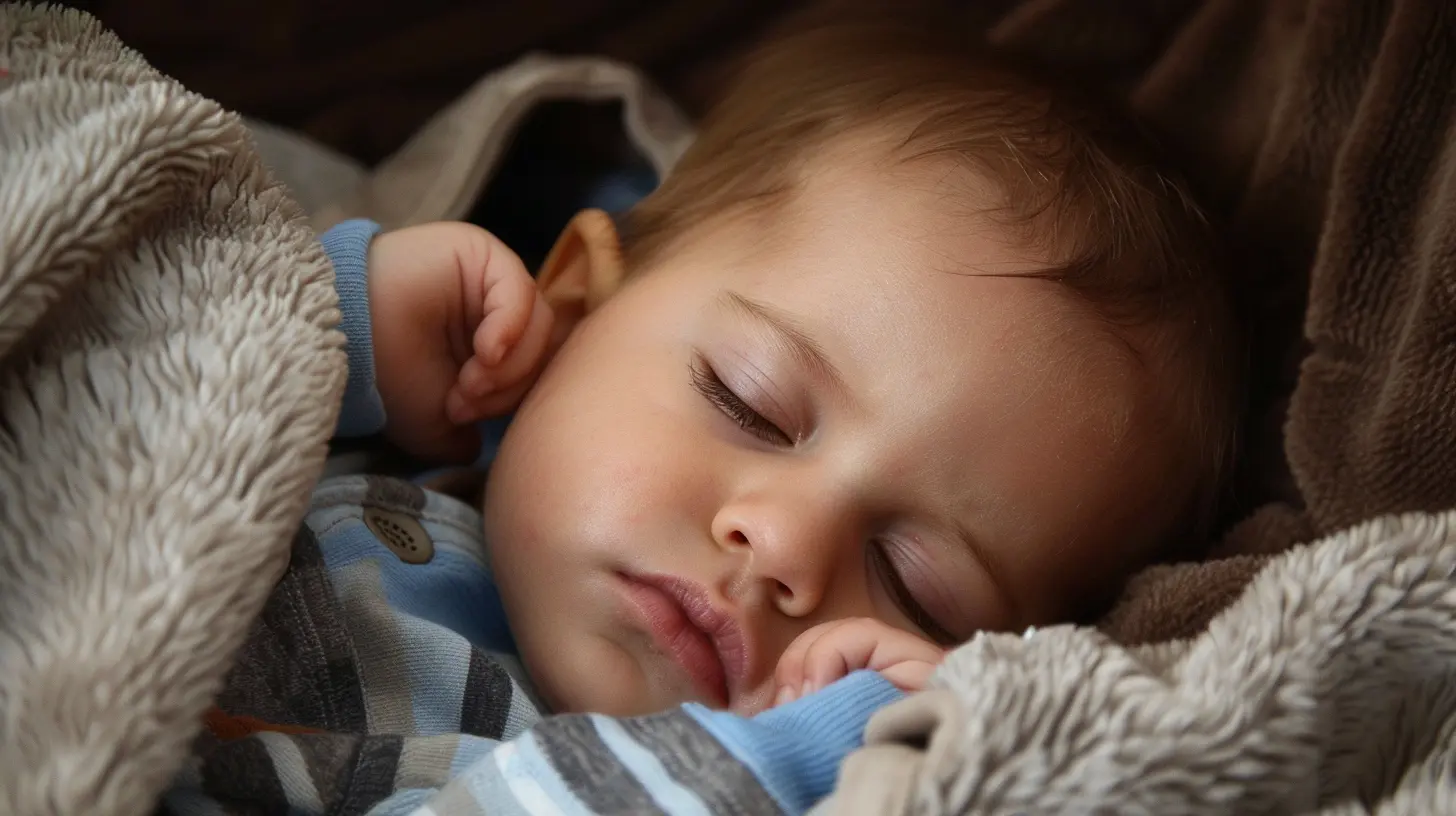Sleep Solutions for Growing Kids: What Every Parent Should Know
13 December 2024
Sleep. It's something we all need, but let’s be honest—when it comes to kids, it’s a whole different ballgame. If you’re a parent, you’ve probably faced those frustrating nights where bedtime feels like a battle. And what about those mornings when your child wakes up cranky because they didn’t sleep well? Don’t worry; you’re not alone.
In this post, we’re diving into sleep solutions for growing kids—practical advice, actionable tips, and everything you need to help your little one sleep like a champ. Let’s get started! 
Why Sleep Is So Important for Kids
We all know that kids need sleep, but why exactly? Sleep isn’t just about rest (although that’s crucial too!). It’s when your child’s body and brain hit the "refresh" button. It’s during sleep that kids grow, process what they’ve learned, and recharge their emotional batteries.Lack of proper sleep can lead to crankiness, difficulty concentrating in school, and even long-term health concerns. When kids don’t get enough quality sleep, it shows—in their mood, their grades, and even their immune system. Simply put, sleep is the foundation for everything else in their life. 
How Much Sleep Do Kids Actually Need?
Guess what? Sleep needs aren’t one-size-fits-all. They change depending on your child’s age. So, how much sleep should your growing kid be getting?Here’s a quick breakdown:
- Toddlers (1-2 years): 11-14 hours (including naps)
- Preschoolers (3-5 years): 10-13 hours (including naps)
- School-age kids (6-12 years): 9-12 hours
- Teenagers (13-18 years): 8-10 hours
Does your child fall within these ranges? If not, it might be time to tweak their sleep routine. 
Signs Your Child Isn’t Getting Enough Sleep
Not sure if your child is sleep-deprived? Here are some red flags to watch for:- They’re cranky or irritable during the day (hello, meltdowns!).
- They have trouble focusing in school or completing homework.
- They’re constantly yawning or seem overly tired.
- They rely on naps way more than usual.
- They wake up groggy and not refreshed.
Sound familiar? Don’t worry—there’s hope. With the right strategies, you can transform their sleep habits. 
Common Sleep Challenges (And How to Handle Them)
Parenting isn’t a walk in the park, especially when sleep troubles crop up. Here are some of the most common issues (plus how to tackle them like a pro):1. Bedtime Resistance
You know the drill. "Five more minutes, please!" Or worse—suddenly, they need water, a snack, or to tell you the story of their life. Bedtime resistance is common, but there’s a fix.The Solution: Establish a consistent bedtime routine. Kids thrive on structure, so make bedtime predictable. A warm bath, brushing teeth, reading a book—these cues tell their brain it’s time to wind down.
Also, avoid screens an hour before bed. Blue light messes with melatonin production, making it harder for them to fall asleep.
2. Nightmares or Night Terrors
These can be terrifying—for you and your child. Kids’ imaginations run wild, and sometimes that leads to bad dreams.The Solution: Comfort is key. If they wake up scared, reassure them calmly. A nightlight or a "dream catcher" can help younger kids feel more secure.
For recurring nightmares, talk about their fears during the day. Sometimes, understanding the root cause (like a stressful event) can help you address it.
3. Sleepwalking or Sleep Talking
These quirky sleep behaviors are more common than you might think, especially in school-aged kids.The Solution: Safety first! Make sure their bedroom is free of hazards (no sharp furniture corners or loose wires). Try not to wake them during an episode—just gently guide them back to bed.
If it happens frequently, consider consulting a pediatrician.
4. Waking Up During the Night
Does your child wake up multiple times during the night? This can disrupt their (and your!) much-needed rest.The Solution: Teach your child self-soothing techniques. Whether it’s hugging a favorite stuffed animal or taking deep breaths, these can help them fall back asleep without needing you to step in.
Also, double-check their sleep environment—too much noise, light, or an uncomfortable mattress could be culprits.
Practical Tips for Better Sleep
Now, let’s talk solutions! These tips will help set the stage for better sleep:1. Create a Sleep-Friendly Bedroom
Think of your child’s bedroom as their personal sleep sanctuary. Here’s how to set it up:- Dim lighting: Use blackout curtains or room-darkening shades.
- Cool temperature: Somewhere between 65-70°F is ideal.
- Minimal noise: Consider a white noise machine if you live in a noisy area.
- Comfortable bed: Invest in a supportive mattress and cozy bedding.
2. Set a Consistent Sleep Schedule
Children thrive on routine. Go to bed and wake up at the same time every day—even on weekends. This helps regulate their internal body clock (kinda like setting an alarm without actually needing one).3. Limit Stimulants Before Bed
Sugary snacks or drinks with caffeine (yes, even chocolate milk!) can sabotage your child’s sleep. Avoid these a few hours before bedtime.4. Encourage Physical Activity
Kids are bundles of energy. Make sure they’re burning it off during the day! Exercise helps regulate their sleep-wake cycle, so encourage outdoor play, sports, or even a family walk. Just make sure they finish high-energy activities at least an hour before bed to help them wind down.5. Mind the Nap Schedule
For younger kids, naps are essential. But when naps run too long or close to bedtime, they can backfire. Stick to age-appropriate nap durations and make sure they're earlier in the day.When to Seek Help
If you’ve tried all the tips above and your child still struggles with sleep, it might be time to call in a pro. A pediatrician or sleep specialist can assess if there’s an underlying issue like sleep apnea or anxiety. Don’t hesitate to get professional advice—it could make all the difference.A Final Word on Sleep
Let’s face it—parenting is no joke, and sleep challenges can leave you feeling like you’re running on fumes. But remember, you’re not striving for perfection. Small, consistent changes can lead to big improvements in your child’s sleep.So go ahead, try these tips, and watch as bedtime transforms from a battle into a sweet, peaceful routine. Trust me—you’ve got this!
all images in this post were generated using AI tools
Category:
Childrens HealthAuthor:

Tiffany Foster
Discussion
rate this article
13 comments
Tia McNab
Because cranky kids need beauty sleep!
February 10, 2025 at 4:53 AM

Tiffany Foster
Absolutely! Quality sleep is essential for kids' mood and overall well-being. 🌙
Knox Sheppard
Every parent wants the best for their child, and quality sleep is vital for growth and development. By prioritizing healthy sleep habits, you’re setting your little one up for success. Embrace these solutions and watch them thrive!
February 3, 2025 at 5:43 AM

Tiffany Foster
Thank you! Prioritizing healthy sleep habits truly lays the foundation for our children's growth and success. Let's empower them to thrive!
Chase Montgomery
Sleep is essential for children's growth and development. Establishing a consistent bedtime routine, creating a calming sleep environment, and monitoring screen time can significantly improve sleep quality. Parents should be aware of individual sleep needs based on age and address any sleep challenges early to promote healthy habits for life.
January 29, 2025 at 5:06 AM

Tiffany Foster
Absolutely! Prioritizing sleep by establishing routines and understanding individual needs is crucial for children's growth and well-being. Early intervention can foster lifelong healthy sleep habits.
Roman Roberts
This article effectively highlights the crucial link between sleep and child development. It offers practical strategies to establish healthy sleep routines, addresses common sleep issues, and emphasizes the role of parental guidance. Overall, it's an essential resource for parents seeking to optimize their children's health and well-being through better sleep practices.
January 23, 2025 at 3:20 PM

Tiffany Foster
Thank you for your feedback! I'm glad you found the article helpful in addressing the importance of sleep for children's development and providing practical strategies for parents.
Olivia Reynolds
As a parent, I know how crucial good sleep is for our little ones! These tips are a lifesaver. A well-rested child means happier days for everyone—thank you for sharing such valuable insights!
January 18, 2025 at 4:29 PM

Tiffany Foster
Thank you for your kind words! I'm glad you found the tips helpful—rested kids truly make for happier households!
Valerie Brown
Thank you for these invaluable sleep tips!
January 13, 2025 at 5:58 AM

Tiffany Foster
You're very welcome! I'm glad you found the tips helpful for your kids' sleep.
Delta McManus
This article offers invaluable insights into optimizing sleep for growing kids. Emphasizing established routines, sleep environment, and addressing common sleep issues, it equips parents with essential strategies to enhance their children's sleep quality, ultimately supporting their overall health and development.
January 8, 2025 at 5:24 PM

Tiffany Foster
Thank you for your thoughtful comment! I’m glad you found the insights helpful for supporting children's sleep and overall well-being.
Teagan Ruiz
Investing in your child's sleep health is a powerful gift!
January 4, 2025 at 3:21 AM

Tiffany Foster
Absolutely! Prioritizing sleep health sets the foundation for your child's overall well-being and development.
Melina McNaughton
Ah, the elusive quest for peaceful slumber! It’s like searching for a unicorn—rare and magical. Remember, parents: a well-rested child is like a cookie without crumbs—nearly impossible, but worth striving for! So let’s tackle those bedtime battles like pros and maybe enjoy a snack in the process!
December 29, 2024 at 5:24 AM

Tiffany Foster
Absolutely! Finding that peaceful slumber can be tough, but it's so rewarding. Let's tackle those bedtime challenges with creativity and care. Happy parenting!
Valerie McEvoy
Ah, the elusive sleep! It’s like a fairytale for parents of growing kids. Let’s face it: if only counting sheep burned calories, we’d all be supermodels! Here’s to discovering the magic tricks for peaceful slumbers! 💤✨
December 21, 2024 at 4:34 AM

Tiffany Foster
Absolutely! Finding those magic tricks for peaceful sleep is essential for both kids and parents. Here’s to unlocking the secrets of restful nights! 💤✨
Greta McClary
Thank you for this insightful article! Understanding sleep’s impact on our kids is crucial. As parents, we all face challenges, and knowing we're not alone in this journey makes it easier to find solutions together.
December 16, 2024 at 4:44 PM

Tiffany Foster
Thank you for your kind words! I'm glad you found the article helpful. Together, we can navigate the challenges of sleep for our kids.
Jamie McClary
Prioritizing sleep for our growing kids is a gift that pays lifelong dividends! Embrace these solutions to foster healthy sleep habits, ensuring your little ones thrive physically and emotionally. Together, let’s nourish their dreams!
December 14, 2024 at 5:29 AM

Tiffany Foster
Thank you for highlighting the importance of sleep for our children! Prioritizing healthy sleep habits truly sets the foundation for their overall well-being. Let's continue to support their growth and dreams together!
Yasmine McKinley
Sleep is crucial for children's development, and establishing a consistent bedtime routine is key. Prioritize sleep hygiene and create a calming environment. Remember, healthy sleep habits now lay the foundation for better focus, mood, and overall well-being in the future.
December 13, 2024 at 4:01 AM

Tiffany Foster
Absolutely! Consistent bedtime routines and a calming environment are essential for fostering healthy sleep habits that support children's development and well-being.
MORE POSTS

Heart-Smart Substitutes for Your Favorite Meals

Benefits of Cross-Training and How to Diversify Your Fitness

Unlocking Your True Potential Through Self-Reflection

The Role of Superfoods in Weight Management

The Connection Between Veganism and Gut Health

Gut Health Benefits of a Plant-Based Diet

Why Sleep is the Ultimate Tool for Personal Growth

Organic Food for Athletes: Fueling Performance Naturally

How Organic Food Choices Support Your Hormonal Health